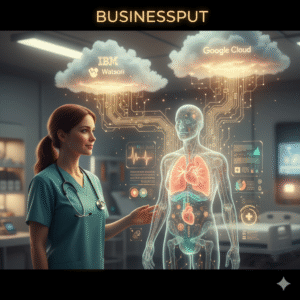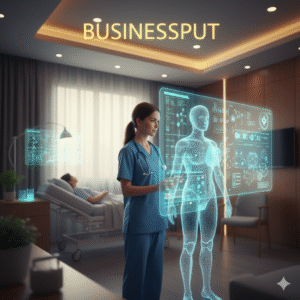🏥 AI Predictive Analytics in Healthcare: Transforming Medicine with Data and Intelligence 💡
🌐 The Rise of Predictive Analytics in Modern Healthcare
Healthcare has entered a new era — one where AI doesn’t just analyze data, it predicts the future. ⚙️
From identifying patients at risk of heart disease 💔 to forecasting hospital admissions, predictive analytics helps doctors act before problems get worse.
Hospitals are using machine learning algorithms that study millions of data points — medical records, test results, wearable devices, and even genetic information — to predict outcomes faster and more accurately than ever before.
🧬 What is Predictive Analytics in Healthcare?
Predictive analytics uses AI and statistical algorithms to forecast health events based on past data.
For example:
-
Predicting which patients might develop diabetes within 5 years 🍩
-
Identifying early signs of cancer recurrence 🧫
-
Forecasting demand for ICU beds or medical supplies 🏥
Essentially, it’s a digital crystal ball for medicine, powered by data and machine learning. 🔮
🤖 How AI Enhances Predictive Healthcare
AI takes predictive analytics to a whole new level:
-
Deep Learning models analyze MRI or CT scans with incredible accuracy. 🧠
-
Natural Language Processing (NLP) reads and understands doctor’s notes and reports. 📋
-
AI-powered wearables track heart rate, oxygen, sleep, and detect irregularities instantly. ⌚
Together, these technologies help predict risks, reduce costs, and personalize treatment plans for every patient. 💉✨

💊 Real-World Applications of AI Predictive Analytics
1️⃣ Early Disease Detection
AI models analyze patient data and detect subtle warning signs of diseases long before symptoms appear.
✅ Example: IBM Watson and Google Health use AI to predict breast cancer risks with higher accuracy than traditional tests.
2️⃣ Patient Risk Stratification
Hospitals use predictive analytics to identify patients most likely to develop complications or be readmitted — allowing doctors to intervene early. 🚨
3️⃣ Operational Efficiency
AI predicts peak times for ER visits, optimizes staffing, and ensures better resource allocation. 🏥💼
4️⃣ Drug Discovery & Clinical Trials
AI speeds up research by analyzing molecular data and predicting how drugs will behave — reducing years of trial and error. ⚗️
5️⃣ Personalized Treatment Plans
Predictive models tailor medications, doses, and therapies based on genetics, lifestyle, and medical history. 🧬💊
🛡️ Data Privacy and Ethical Concerns in AI-Driven Healthcare
While AI has the power to revolutionize healthcare, it also opens a complex conversation about privacy, ethics, and trust. 🌍💭
When you’re dealing with something as sensitive as a person’s health data, responsibility isn’t optional — it’s essential.
🔐 Patient Privacy and Data Security
Every patient’s health record holds deeply personal information — from genetic data to mental health history. If this data falls into the wrong hands, it can have serious consequences.
That’s why AI systems must follow strict data protection laws like HIPAA and GDPR. Hospitals and tech providers now use advanced encryption, anonymization, and secure data storage methods to keep patient information safe.
💬 Patients need to feel confident that their health data is used only for care and research — not for profit or misuse.
⚖️ Algorithmic Bias and Fairness
AI is only as fair as the data it learns from. If a model is trained on biased or incomplete datasets, it can unintentionally favor one group over another.
For example:
-
An AI trained mostly on data from one demographic might misdiagnose patients from underrepresented backgrounds.
-
Predictive models might overlook certain symptoms that vary across gender or ethnicity.
That’s why researchers and healthcare organizations are working to make datasets more diverse and AI models more transparent, ensuring fairness and inclusivity. 🌍💙
👩⚕️ Transparency and Explainability
Doctors must understand how and why an AI system makes a particular prediction — whether it’s diagnosing a disease or recommending treatment.
Black-box AI systems can make decision-making risky if clinicians can’t explain their reasoning to patients.
To address this, developers are focusing on “Explainable AI (XAI)”, which provides clear, human-readable insights about how predictions are made.
💡 This ensures AI becomes a trusted medical partner, not a mysterious decision-maker.
🧠 Accountability and Human Oversight
Even with the most advanced AI, final decisions should always rest with humans. Doctors, not algorithms, are responsible for interpreting AI recommendations and making ethical calls.
Healthcare institutions must establish clear accountability frameworks — defining who is responsible if an AI system gives incorrect or harmful advice.
This collaboration between human judgment and machine intelligence ensures safety and trust at every step. 🤝
🌿 Informed Consent and Patient Awareness
Patients deserve to know when and how AI is being used in their treatment.
Hospitals are increasingly introducing AI disclosure policies — explaining what data is collected, how it’s processed, and how predictions are made.
🗣️ Transparency builds trust, and trust strengthens the patient–doctor relationship — even in an AI-powered world.
⚙️ Ethical Data Sharing for Research
AI thrives on data — but sharing data between hospitals, labs, and companies must be done carefully.
New methods like federated learning allow AI to learn from multiple datasets without moving the data itself, reducing privacy risks while advancing medical research.
This balance between innovation and protection is what will define the next era of ethical healthcare AI. 🌐💫
🌍 The Future of Predictive Analytics in Healthcare
The next decade will bring even smarter systems — powered by 5G, IoT, and quantum computing. 🚀
Hospitals will move from reactive care to preventive and proactive care, predicting illness before it happens.
Soon, your smartwatch might alert your doctor before you even feel sick — that’s the true promise of AI-driven predictive healthcare. 💙

🧠 Key Predictive Analytics Tools Used in Healthcare 💉
In today’s data-driven hospitals and research labs, predictive analytics tools are like digital assistants for doctors and scientists — they sift through massive amounts of patient data and help make faster, smarter decisions. Let’s explore the top ones that are transforming healthcare 👇
🏥 1. IBM Watson Health
IBM Watson Health is one of the most recognized names in healthcare AI. 💙
It uses machine learning and natural language processing (NLP) to read and interpret medical data — from patient records to journal articles.
-
It helps doctors diagnose diseases earlier.
-
Suggests treatment options based on global medical data.
-
Even assists in cancer research by identifying gene mutations linked to specific cancers.
💡 In short: Watson acts like a super-intelligent medical researcher that never stops learning.
☁️ 2. Google Cloud Healthcare AI
Google’s healthcare platform connects AI, data analytics, and cloud computing to make hospitals more efficient.
It allows healthcare providers to store, manage, and analyze data securely — everything from medical imaging to patient monitoring.
-
Uses AI models to detect anomalies in scans (like lung nodules or tumors).
-
Enables real-time data exchange between hospitals.
-
Simplifies compliance with healthcare privacy standards like HIPAA.
✨ Think of it as Google’s way of giving hospitals a tech-powered brain that connects everything safely and smartly.
📊 3. SAS Predictive Analytics
SAS is known for its strong data analytics and statistical modeling. In healthcare, it’s used to:
-
Predict disease outbreaks or patient readmissions.
-
Identify high-risk patients for chronic diseases like diabetes or heart failure.
-
Optimize hospital operations and staffing needs.
⚙️ SAS provides user-friendly dashboards that allow healthcare managers to make decisions based on real-time data.
It’s like having a health strategist that turns raw numbers into life-saving actions.
🧩 4. Microsoft Azure Machine Learning
Microsoft’s AI platform brings the power of machine learning to the cloud.
Hospitals use Azure to train models that can:
-
Predict treatment outcomes.
-
Improve patient flow in emergency departments.
-
Automate administrative tasks like billing or scheduling.
It’s secure, scalable, and integrates seamlessly with existing healthcare systems.
💡 Imagine an AI assistant quietly running behind the scenes, keeping everything optimized and connected.
⚡ 5. RapidMiner
RapidMiner is loved for its no-code, drag-and-drop interface, which means even non-programmers can build predictive models.
In healthcare, it’s used to:
-
Detect patient health risks early.
-
Analyze data from wearables and sensors.
-
Visualize patient journeys and outcomes.
🩺 It’s perfect for hospitals that want AI-powered insights without needing a big data science team.
🧬 6. DataRobot
DataRobot specializes in automated machine learning (AutoML) — it builds, tests, and deploys predictive models quickly.
Healthcare organizations use it to:
-
Predict disease progression.
-
Optimize treatment effectiveness.
-
Forecast hospital resource usage.
💡 It’s like a fast, tireless data scientist that helps doctors focus on patients instead of coding.
🌊 7. H2O.ai
H2O.ai is an open-source AI platform that’s all about flexibility and transparency.
It’s used in hospitals for:
-
Real-time patient risk scoring.
-
Predicting hospital readmissions.
-
Improving diagnostic accuracy.
Because it’s open-source, healthcare teams can customize algorithms and adapt them to their own needs — making it a favorite among researchers and data scientists.
✨ It’s like having an open lab for building your own AI healthcare models.
These tools combine clinical data, real-time analytics, and cloud power to make healthcare smarter and faster. ⚙️
🧠 8. TensorFlow (by Google)
TensorFlow is one of the most widely used open-source machine learning frameworks. It helps healthcare researchers build custom predictive models for everything from disease progression to medical imaging analysis.
-
Used for predicting heart disease, diabetes, and cancer risks.
-
Analyzes complex medical images using deep learning.
-
Supports real-time predictions for wearable devices and hospital systems.
💬 Think of it as the “engine room” for building intelligent, health-focused AI models.
🧬 9. PyTorch (by Meta AI)
PyTorch is another open-source platform popular among healthcare data scientists.
It allows quick experimentation with neural networks for predictive tasks like diagnostic imaging, drug discovery, and genomic analysis.
-
Favored in academic research and hospitals.
-
Helps create deep learning models that adapt and learn continuously.
🧩 It’s the creative lab where AI doctors are trained to spot what humans might miss.
📈 10. Oracle Health Data & Analytics Platform
Oracle brings its enterprise data expertise to healthcare, combining predictive analytics with cloud computing.
-
Integrates EHRs (Electronic Health Records) from multiple hospitals.
-
Forecasts patient flow, readmissions, and treatment outcomes.
-
Helps providers make data-backed financial and clinical decisions.
⚙️ Oracle’s strength lies in connecting scattered healthcare systems into one intelligent, predictive network.
💉 11. SAP Health Engagement Platform
SAP uses predictive analytics to improve patient engagement and chronic disease management.
-
Tracks patient behavior and treatment adherence.
-
Predicts hospitalization risks and helps doctors adjust care plans in real time.
-
Enables data sharing among clinics while maintaining strong privacy standards.
💡 It bridges the gap between healthcare providers and patients through predictive communication.
🧫 12. Alteryx
Alteryx combines data preparation, analytics, and AI modeling in a user-friendly interface — perfect for healthcare analysts who don’t code.
-
Helps hospitals clean and visualize data quickly.
-
Identifies patient trends and predicts disease spikes.
-
Reduces wait times and improves resource planning.
✨ It’s like a digital assistant that organizes chaos into clarity.
🩻 13. KNIME Analytics Platform
KNIME is an open-source tool known for visual workflows that make predictive analytics easier to use.
-
Supports healthcare use cases like biomedical research and hospital efficiency modeling.
-
Connects with Python, R, and TensorFlow for deeper insights.
-
Ideal for smaller clinics looking to start their AI journey.
🌿 It’s flexible, transparent, and loved by data-savvy healthcare innovators.

💡 14. Qlik Sense
Qlik Sense focuses on data visualization and real-time prediction.
It enables hospitals to monitor performance metrics, track patient outcomes, and spot health trends before they escalate.
-
Interactive dashboards for decision-makers.
-
Predictive alerts for critical patients.
-
Integration with AI-powered analytics tools.
📊 It turns hospital data into clear, visual stories that guide better care.
🌍 15. Palantir Foundry for Healthcare
Palantir’s Foundry platform is used globally by governments, hospitals, and researchers to manage large-scale healthcare data.
-
Combines data from hospitals, supply chains, and research labs.
-
Predicts vaccine demand, epidemic spread, and patient outcomes.
-
Used by major health systems during the COVID-19 pandemic.
🔮 It’s the command center for national-level healthcare prediction and planning.
🧩 16. AWS HealthLake (Amazon Web Services)
AWS HealthLake uses cloud-based machine learning to organize and analyze healthcare data.
-
Converts messy medical text into structured, searchable data.
-
Predicts disease progression and treatment success.
-
Scalable for hospitals and research institutions of all sizes.
☁️ It’s like a data lake that never sleeps — always learning, always predicting.
🧠 17. Epic Cognitive Computing (Epic Systems)
Epic is a leader in electronic health record (EHR) systems, and its cognitive computing tools add predictive power.
-
Identifies at-risk patients in real time.
-
Suggests interventions for better outcomes.
-
Integrates seamlessly into everyday hospital operations.
🏥 Epic helps doctors not only record history — but also predict the future of patient health.
✨ Final Thoughts
AI predictive analytics isn’t about replacing doctors — it’s about empowering them with data-driven insights. 👩⚕️💻
From hospitals to home healthcare, predictive AI ensures that medicine is not just reactive but preventive, personalized, and precise.
We’re heading toward a world where data saves lives, one prediction at a time. 🌍❤️Each of these tools brings something unique to the table — from IBM’s deep medical knowledge to Google’s real-time cloud analytics. Together, they’re helping create a future where healthcare is smarter, faster, and more personalized than ever before. 🌍💉
The future isn’t about one single tool — it’s about ecosystems where AI, cloud computing, and predictive models all work together.
Each of these tools helps healthcare move from reactive care to proactive, preventive medicine, where data saves lives before diseases strike. 🌟

